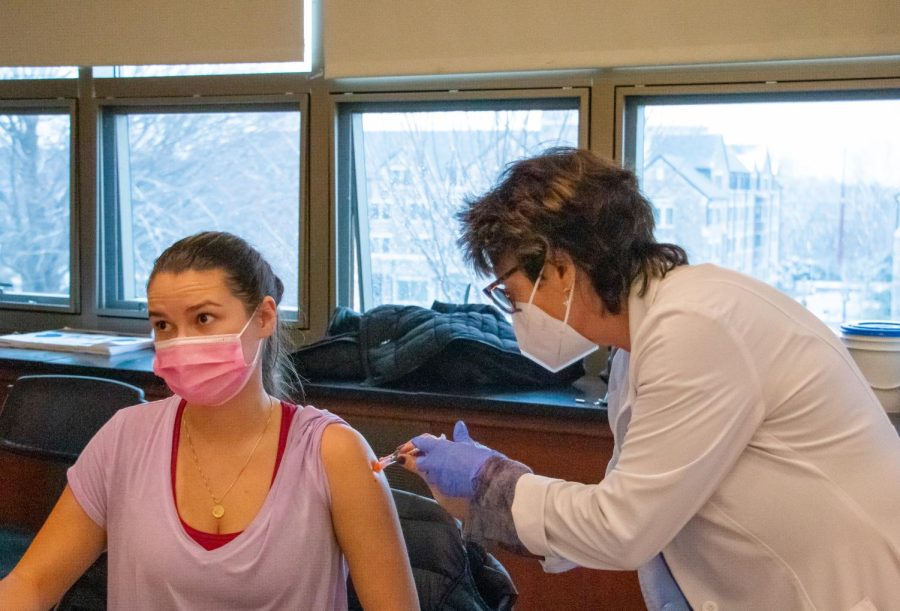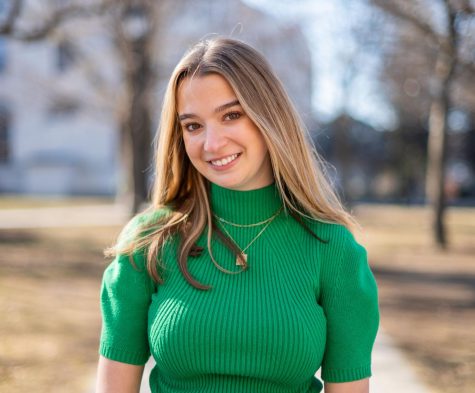Opinion: Villanova Should Continue to Protect Its Students
Courtesy of Graydon Paul/Villanovan Photography
Villanova has made booster shots available on campus.
February 9, 2022
Before students returned to campus for the spring semester, the University announced that all eligible community members would be required to receive the COVID-19 booster shot before Jan. 31. With this cutoff date just in our rearview, debate surrounding the vaccine within the community has yet to subside.
Petitions and pleas calling for the University to reverse the booster requirement have circulated among parent groups and social media. The petitioners claim not to be against the vaccine but do not want the University to require boosters.
The petition has 303 signatures. While this may seem like a substantial number, many of them are from non-Villanova community members. In a student population of about 7,000 undergraduates, which equates to roughly 14,000 parents, this number is insignificant.
The booster requirement is beneficial to the student body, and controversy surrounding this issue is dramatized and not based in science. The University should not change its policy based on these complaints and should continue to protect students, faculty and staff as much as it possibly can.
“The vast majority of people currently hospitalized for COVID-19 are unvaccinated,” wrote Dr. Joseph Comber, a biology professor at Villanova in an email. “The CDC has some great data to this end. As of December unvaccinated individuals were 16 times more likely to be admitted to the hospital than vaccinated individuals (over the age of 18). For those who are vaccinated, the booster dose is even more effective at preventing hospitalization than two doses alone.”
Research proves that the vaccine is not only effective in minimizing the symptoms of COVID-19, but the number of people who are hospitalized and have died of COVID is majority unvaccinated. The belief that the booster is ineffective because people can still spread COVID while vaccinated is misleading and unfounded.
“Vaccines are medical interventions that teach our immune system what to look out for,” Dr. Comber wrote. “We experience some kind of injection that delivers a weakened germ, an inactive germ, or part of a germ, and our immune system thinks that it’s time to fight! So the immune system goes through all of the motions and produces those special memory cells again. If we ever encounter that germ again, those memory cells are primed and ready to battle. All because of vaccination.”
As Dr. Comber explained, the purpose of the booster is to prepare one’s body better should it be infected with the virus. This goes for any vaccine. Vaccines do not magically prevent infection, a point Dr. Comber acknowledged.
“It would be amazing if all vaccines were able to prevent infection completely,” he wrote. “But in fact quite a few don’t do that as well as we would like.”
The purpose of being vaccinated is to lessen the severity of the virus’ impact on the body, not to prevent a person from being infected in the first place.
The University’s booster requirement is not meant to strip anyone of free choice. It is intended to protect the student body with the weapons available to us.
“The booster is an important tool that will allow us to remain on-campus and in-person — and to function more normally throughout this semester,” Dr. Mary McGonigle, Director of Villanova University Health Center, wrote in an email.
Dr. McGonigle explained the University’s method for implementing COVID regulations and requirements.
“In making campus health and safety decisions, Villanova’s medical team follows CDC guidance as well as regularly reviewing current research and conferring with state and local departments of health,” she wrote. “The CDC, which includes top medical experts in infectious disease, strongly recommends the booster.”
The University outlined exemptions for the booster for legitimate and approved reasons but encourages not only vaccination within the community but also compliance with masking guidelines and routine testing.
Discussions and debates surrounding the vaccine on and off campus are riddled with misinformation, and advocating against the booster requirement defies science. The booster is like any other vaccine we receive, and, if nothing else, should be viewed as one more thing we can do to work towards the end of this pandemic.
“The vaccines are safe, effective, and prevent severe infection,” Dr. Comber wrote. “This doesn’t mean that vaccines are the only thing we need to do. We should continue to wear masks indoors, limit our exposure to indoor settings without masks (i.e., restaurants), and be cognizant that our individual choices impact the Villanova and surrounding communities.”
It is important that the Villanova community is part of the solution. We are lucky to have been on campus throughout the pandemic, something that has been possible because of our community-wide willingness to follow the regulations. The best tool we have to protect ourselves and others is to get vaccinated.











